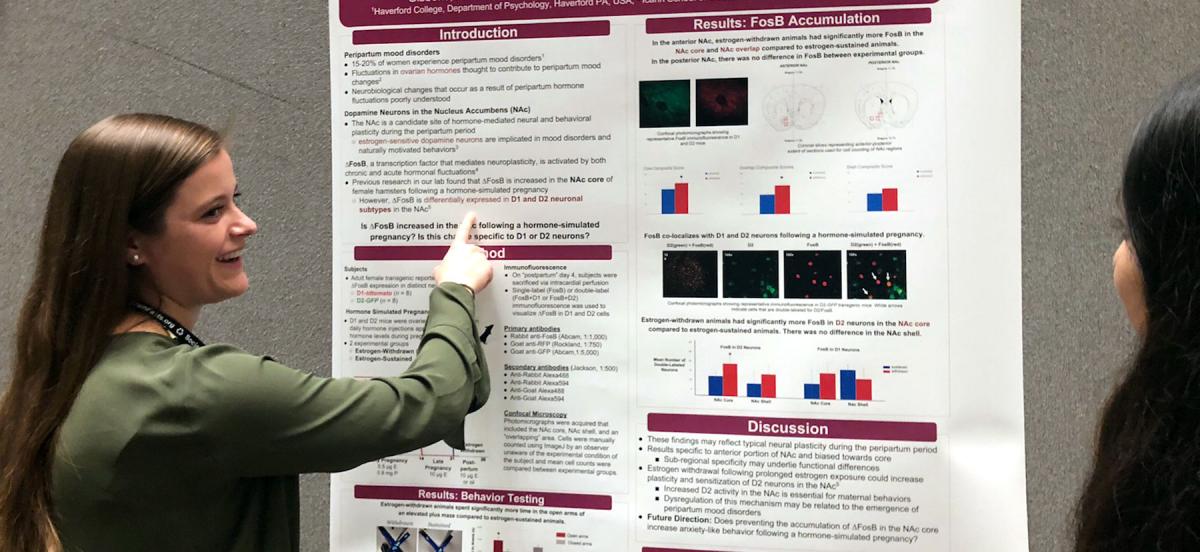Bi-Co Interdisciplinary Neuroscience Major Launches

Psychology major and neuroscience minor Alison Gibbons '19 presents her poster on research done in Laura Been's neuroscience lab.
Details
The program, which began as a concentration over 25 years ago and developed into a minor in 2013, will welcome its first majors this spring.
The Bi-Co Interdisciplinary Neuroscience Program—which brings together perspectives from medicine, biology, and psychology, among other fields, for an in-depth study of the nervous system and behavior—has long been popular with students at Haverford and Bryn Mawr. There are currently 53 neuroscience minors across the Bi-Co, and 20 Fords expect to graduate with the minor this year. But, says Assistant Professor of Psychology Laura Been, who has coordinated the minor since 2016, the most common question she’s fielded from prospective students over the past five years is, “Can I major in neuroscience?” Now, the answer is finally yes.
“Given the degree of student interest and a critical mass of faculty able to offer a stable curriculum of courses on a consistent basis, the time does, indeed, seem right to introduce this new major at Haverford, putting us on par with many other institutions,” said Provost Linda Strong-Leek.
The path to becoming a major has been a long one. Neuroscience was first introduced at Haverford as a concentration in neural and behavioral science in 1995, and became a Bi-Co interdisciplinary minor in 2013. In 2015, a working group of Haverford and Bryn Mawr faculty across biology and psychology departments began meeting, supported in part by a Mellon Foundation Brainstorming grant, to discuss the introduction of a major. And this spring the Educational Policy Committee approved the introduction of the new major.
“It has been a very intentional and deliberative process to create a major that is rigorous, inclusive, and sustainable,” said Been.
Two new classes have been added to support the major: a 100-level “Introduction to Neuroscience”class and a “Senior Capstone” course. Additionally, neuroscience majors will be required to take a semester each of introductory biology, chemistry, psychology, and statistics, as well as four credits of upper-level neuroscience courses and one lab course in neuroscience.
For students like José E. Rodríguez ’22, who had planned on minoring in neuroscience, this new program expansion allows him to rethink his major course of study. Based solely on his interests, the junior from Puerto Rico, has already taken most of the new major’s prerequisites, and plans to declare a neuroscience major.
“Neuroscience is the passion I never knew I had until I came to discover it through its minor,” said Rodríguez. “I think with its offering as a major now, many will be interested both by it's novelty and by it's high applicability and usefulness in life as a degree that combines exquisitely with many other minor degrees—bio, econ, chem, philosophy, linguistics, English, etc.—or as a minor in itself alongside any other major.”
Neuroscience, Been notes, is inherently a cross-disciplinary field, and the working group intentionally wanted the new major’s requirements to reflect that.
“The faculty involved in the program work on research questions that range from the cellular and molecular level to the systems and behavioral level to the cognitive level,” she said. “In the future, we hope to expand the major to include even more disciplines, including computer science, visual studies, and philosophy.”
Those faculty members include working group members Professor of Psychology Rebecca Compton, Assistant Professor of Biology Roshan Jain, Professor of Biology Rob Fairman, Bryn Mawr Assistant Professor of Psychology Laura Grafe, Bryn Mawr Professor of Psychology Anjali Thapar, and Bryn Mawr Associate Professor of Biology Greg Davis. (The working group also previously included Bryn Mawr Professor Emeritus of Psychology Earl Thomas, Bryn Mawr Professor Emeritus of Biology Peter Brodfuehrer, and Bryn Mawr Professor Emeritus of Biology Karen Grief.)
“The Bi-Co relationship is a huge strength of the Neuroscience Program,” said Been. “This was true for the minor and is especially critical for the major. It allows us to expand the number and breadth of our neuroscience course offerings, provides students with opportunities to explore different research areas and perspectives, but keeps upper-level course enrollments small enough that we can do exciting things pedagogically and methodologically.”
The program will continue to offer a minor, in addition to the major, for those students whose primary curricular interests are in different fields but also wish to pursue their interests in the brain and behavior. But for those students who have long hungered for a more in-depth course of study, this new major fulfills those aspirations.
“It means a lot to me,” said Rodríguez, “that I can finally pursue what I am actually specifically interested in.”



